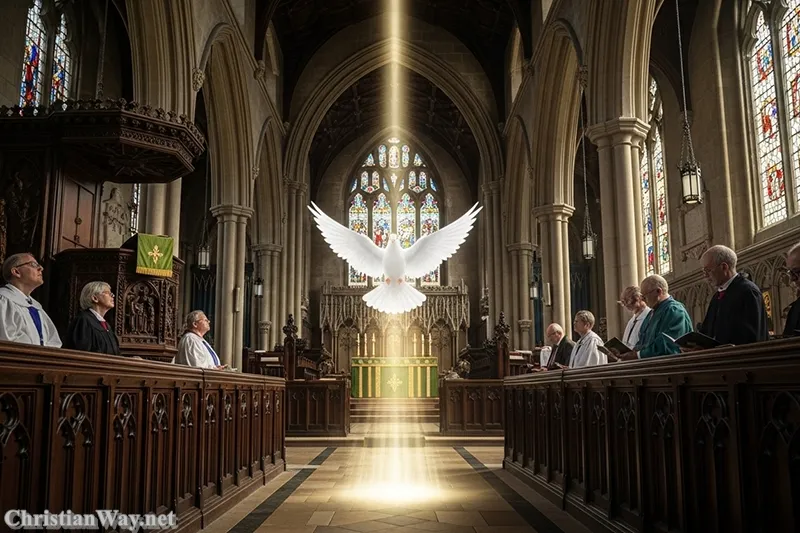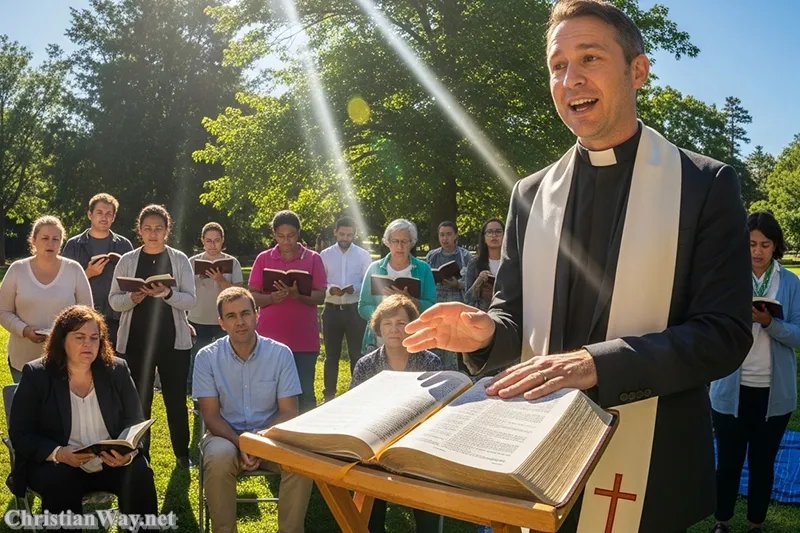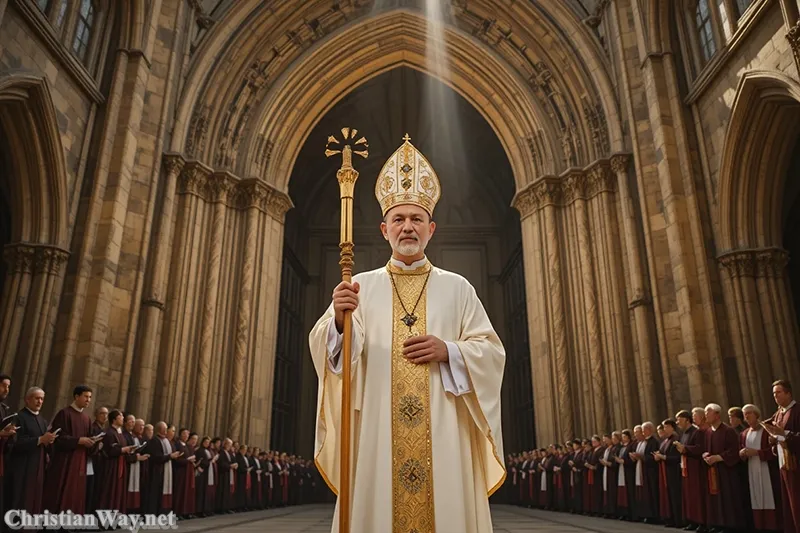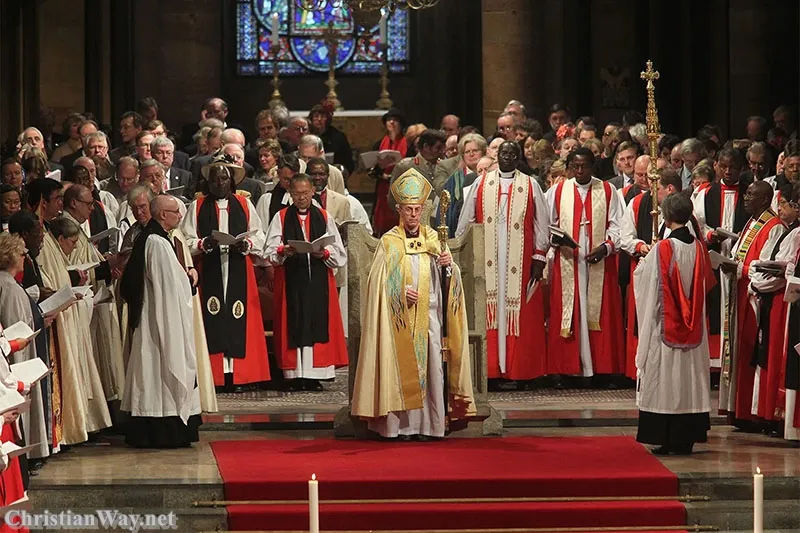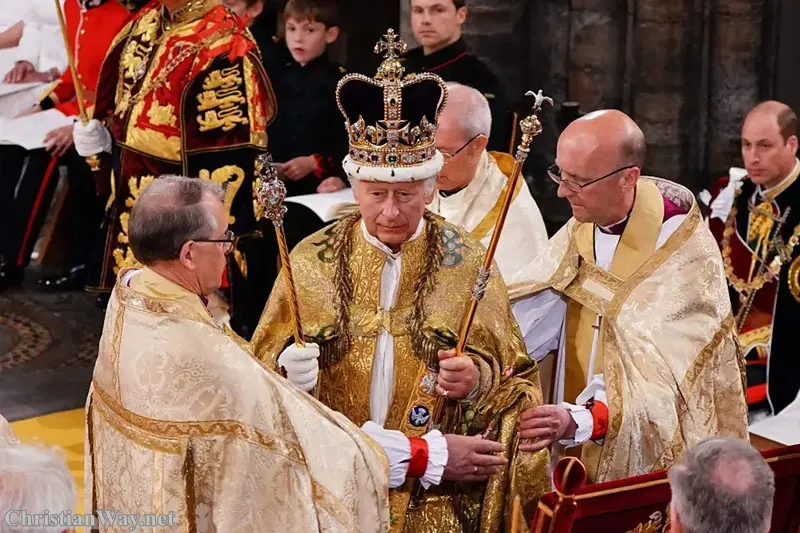Dear friends in Christ,
Every branch of the Christian family tree bears the same name — Jesus Christ — and every heart that follows Him learns to love in its own rhythm of faith and worship. In the Anglican tradition, this love for Christ takes on a distinctive harmony: rooted in Scripture, nurtured by prayer, and expressed through sacrament and service. To understand Jesus Christ in Anglicanism is to understand a Church that holds together the ancient and the living, the catholic and the reformed, the mystical and the practical.
In every parish, from the quiet English countryside to vibrant cathedrals in Africa and the Americas, the words of the Eucharist rise like a heartbeat of the Church: “This is my Body, given for you.” These words are not mere ritual; they are the center of Anglican life — a confession that Jesus Christ is truly present among His people, redeeming and sustaining them through grace.

The Anglican tradition does not attempt to define Christ through a single lens or formula. Instead, it holds Christ in reverent mystery — known through Scripture, worship, and personal faith, yet always beyond full comprehension. The beauty of Anglican theology lies in this humility: Christ is both the Eternal Word and the living Lord who walks beside us on the road, calling us to holiness in daily life.
The Centrality of Jesus Christ in Anglican Faith
At the core of Anglican belief is the affirmation shared with the universal Church: “Jesus Christ is Lord.” This confession stands at the heart of the Thirty-Nine Articles of Religion, the Book of Common Prayer, and every act of Anglican worship.
For Anglicans, Jesus is not merely a historical figure or a moral example — He is the living Son of God, the second Person of the Holy Trinity, “of one substance with the Father,” as declared in the Nicene Creed. The Anglican faith proclaims the Incarnation as the turning point of all history: “The Word was made flesh and dwelt among us” (John 1:14).
Christ the Revealer of God
Anglicans affirm with Scripture that in Jesus Christ, God is fully revealed. He is the visible image of the invisible God (Colossians 1:15), the One through whom creation came to be and through whom it is redeemed. This revelation is not only an event of the past but a living encounter — experienced whenever the Word is proclaimed and the Sacrament celebrated.
In every liturgy, Christ is proclaimed as the Lamb of God who takes away the sin of the world, and the Church responds in faith, “Lord, I am not worthy.” This humility before the divine mystery of Christ forms the heart of Anglican spirituality.
Christ in the Scriptures: The Word that Speaks Still
The Anglican Church is often described as a Church of the Word — not only because of its reverence for Scripture, but because it believes that in the reading of the Word, Christ Himself speaks.
The Book of Common Prayer weaves Scripture into every moment of worship — from Morning and Evening Prayer to Holy Communion. Through this rhythm, Anglicans encounter Christ as the living Word who instructs, comforts, and challenges.
Scripture as the Mirror of Christ
For Anglicans, the Bible is not merely a book of moral teaching; it is a mirror that reflects the face of Jesus. As the Article VI of Religion states: “Holy Scripture containeth all things necessary to salvation.”
But this Scripture is read not in isolation — it is interpreted within the living community of faith, guided by reason and tradition. The Anglican approach, often summarized as “Scripture, Tradition, and Reason,” ensures that Christ is encountered not through private interpretation alone but through the wisdom of the whole Body of Christ.
In this way, the Anglican believer learns to hear Christ’s voice both in the stillness of prayer and in the gathered assembly of worshippers who listen together to the Word of God.
Christ in the Sacraments: Presence in Bread and Wine
If Scripture reveals Christ as the Word, the Sacrament reveals Him as the Bread of Life. Anglicanism holds a deep and reverent belief in the Real Presence of Christ in the Eucharist — not as a scientific explanation, but as a holy mystery.
The Eucharist: The Center of Anglican Worship
At every altar, Christ is made known “in the breaking of the bread” (Luke 24:35). The Eucharist is not only a memorial but a participation in the one sacrifice of Christ upon the Cross. Anglicans affirm that in this holy meal, heaven and earth are joined, and the believer communes with the risen Lord.
The words of the Prayer of Humble Access — “Grant us therefore, gracious Lord, so to eat the flesh of thy dear Son Jesus Christ, and to drink his blood” — reveal the depth of Anglican devotion to the mystery of Christ’s presence. It is not an abstract theology but a living act of faith: to kneel at the altar is to meet the Savior Himself.
Baptism: Dying and Rising with Christ
Likewise, Baptism is seen as the believer’s entrance into the life of Christ — a dying to sin and a rising to new life. The Anglican Church baptizes in the name of the Trinity, affirming that through this sacrament, the grace of Christ is truly imparted.
This understanding unites Anglicans with the ancient Church and with Christians of every age. Baptism is not symbolic alone but sacramental — a means by which Christ acts to incorporate the believer into His Body, the Church.
The Cross and Resurrection: The Mystery of Redemption
At the heart of Anglican devotion lies the Cross. Every liturgy, every prayer, every hymn centers on the redeeming love of Christ crucified and risen.
The Cross as the Revelation of Love
For Anglicans, the Cross is not a sign of defeat but the throne of divine mercy. The Book of Common Prayer leads believers to meditate deeply on this mystery, especially during Lent and Holy Week. The hymns of Isaac Watts and Charles Wesley — often sung across Anglican churches — express this theology beautifully:
“When I survey the wondrous Cross
On which the Prince of Glory died,
My richest gain I count but loss,
And pour contempt on all my pride.”
The Cross reveals both the gravity of sin and the depth of God’s love. It reminds us that salvation is not achieved by human effort but given freely by grace through faith in Jesus Christ.
The Resurrection as the Light of Hope
The Anglican tradition celebrates Easter not as a single day but as a season — fifty days of joy declaring that death has been conquered. The Easter Anthems proclaim:
“Christ our Passover is sacrificed for us: therefore let us keep the feast.”
This proclamation is not mere remembrance but the assurance that Christ’s victory continues to transform lives today. For Anglicans, resurrection faith means living in hope — trusting that every wound can be healed and every darkness overcome by the light of Christ.
Christ in the Church: The Body of the Risen Lord
Anglicans believe that Christ continues His work through His Body, the Church. The Church is not a mere institution or organization but the living presence of Christ in the world.
A Catholic and Reformed Vision
One of Anglicanism’s great gifts to Christianity is its ability to be both catholic and reformed — rooted in the ancient creeds, sacraments, and episcopal order of the historic Church, yet open to the reforming power of the Word.
Christ is seen as the unifying center of this balance. The authority of bishops, the beauty of liturgy, and the preaching of the Gospel all find meaning only in Him. Anglicanism thus refuses to separate spiritual life from communal worship; it insists that to follow Christ is to belong to His Body.
Christ in Mission and Service
To know Christ is also to serve Him. The Anglican Communion is profoundly engaged in mission — education, healthcare, reconciliation, and justice. This is not social activism for its own sake, but a continuation of Christ’s own ministry of healing and mercy.
The Five Marks of Mission — proclaiming the Good News, teaching the faith, serving others, transforming injustice, and safeguarding creation — are all ways the Anglican Church seeks to make Christ known in the world.
Christ in Daily Life: The Anglican Spiritual Path
Beyond Sunday worship, Anglican spirituality calls believers to live in continual communion with Christ through prayer and holiness of life.
The Daily Office: Walking with Christ Each Day
Morning and Evening Prayer — the heartbeat of Anglican devotion — bring the believer into rhythm with the life of Christ. Through psalms, readings, and intercessions, the soul is drawn into daily fellowship with God.
This rhythm teaches that prayer is not an escape from the world but a way of sanctifying it. Whether said in a cathedral or whispered at home, these prayers form a bridge between the soul and Christ’s abiding presence.
The Way of Holiness
The Anglican tradition understands sanctification not as perfection but as growth in love. To follow Jesus is to become more like Him — gentle, patient, truthful, and merciful. This journey, sustained by grace, unfolds through repentance, prayer, and acts of charity.
Saintly figures such as Lancelot Andrewes, John Keble, and Evelyn Underhill show that holiness in Anglicanism is not confined to monasteries or pulpits but can be lived quietly in every vocation.
Christ as the Bridge of Unity
Because Anglicanism stands between traditions, it has long seen itself as a bridge — between Rome and Geneva, between East and West, between faith and reason. At the heart of this vocation lies Christ Himself, who prayed that His followers “may all be one” (John 17:21).
Ecumenical Witness
Anglicans believe that true unity is found not in uniformity but in shared love for Christ. Across the global Communion — from Canterbury to Cape Town, from Sydney to Singapore — the same Gospel is proclaimed: that Jesus Christ is Lord and Savior of all.
This catholic breadth allows Anglicans to speak the language of dialogue and reconciliation, trusting that in Christ, all divisions will one day be healed.
In the Light of Christ
To speak of Jesus Christ in the Anglican tradition is to speak of a faith that listens, kneels, and serves — a faith that holds together the majesty of God and the intimacy of grace.
In Scripture, we hear His voice.
In the Eucharist, we receive His presence.
In the Church, we live His life.
In the world, we bear His light.
This is the Anglican vision: that every believer, every parish, and every act of worship might reveal the living Christ — not confined to altars or creeds, but reigning in every heart that says, “My Lord and my God.”
Reflect and Pray
Lord Jesus Christ,
You are the Word made flesh,
The Bread of Life,
The Light of the world.
Grant that we, walking in the way of Your truth,
May find joy in Your presence,
And strength to serve You in love.
Let Your Church, united in heart and purpose,
Show forth Your glory in word and deed,
That all the world may know the power of Your resurrection
And the gentleness of Your mercy.
May we live each day in gratitude,
And when our journey ends,
May we see You face to face —
The Lord of grace,
The Savior of our souls.
Amen.
— Fr. John Matthew, for Christian Way
